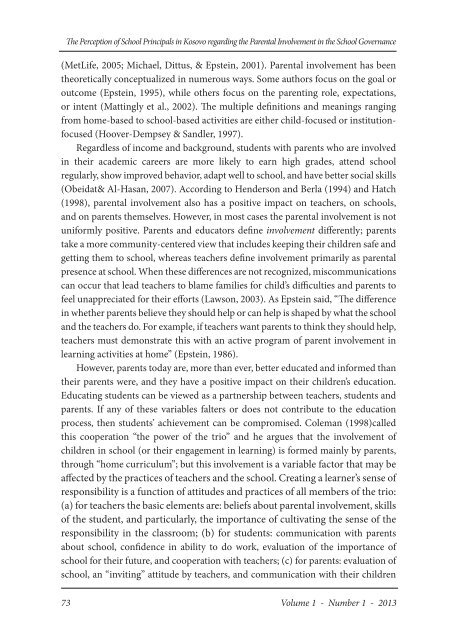Download - qendra per arsim demokratik
Download - qendra per arsim demokratik
Download - qendra per arsim demokratik
Create successful ePaper yourself
Turn your PDF publications into a flip-book with our unique Google optimized e-Paper software.
The Perception of School Principals in Kosovo regarding the Parental Involvement in the School Governance(MetLife, 2005; Michael, Dittus, & Epstein, 2001). Parental involvement has beentheoretically conceptualized in numerous ways. Some authors focus on the goal oroutcome (Epstein, 1995), while others focus on the parenting role, expectations,or intent (Mattingly et al., 2002). The multiple definitions and meanings rangingfrom home-based to school-based activities are either child-focused or institutionfocused(Hoover-Dempsey & Sandler, 1997).Regardless of income and background, students with parents who are involvedin their academic careers are more likely to earn high grades, attend schoolregularly, show improved behavior, adapt well to school, and have better social skills(Obeidat& Al-Hasan, 2007). According to Henderson and Berla (1994) and Hatch(1998), parental involvement also has a positive impact on teachers, on schools,and on parents themselves. However, in most cases the parental involvement is notuniformly positive. Parents and educators define involvement differently; parentstake a more community-centered view that includes keeping their children safe andgetting them to school, whereas teachers define involvement primarily as parentalpresence at school. When these differences are not recognized, miscommunicationscan occur that lead teachers to blame families for child’s difficulties and parents tofeel unappreciated for their efforts (Lawson, 2003). As Epstein said, “The differencein whether parents believe they should help or can help is shaped by what the schooland the teachers do. For example, if teachers want parents to think they should help,teachers must demonstrate this with an active program of parent involvement inlearning activities at home” (Epstein, 1986).However, parents today are, more than ever, better educated and informed thantheir parents were, and they have a positive impact on their children’s education.Educating students can be viewed as a partnership between teachers, students andparents. If any of these variables falters or does not contribute to the educationprocess, then students’ achievement can be compromised. Coleman (1998)calledthis coo<strong>per</strong>ation “the power of the trio” and he argues that the involvement ofchildren in school (or their engagement in learning) is formed mainly by parents,through “home curriculum”; but this involvement is a variable factor that may beaffected by the practices of teachers and the school. Creating a learner’s sense ofresponsibility is a function of attitudes and practices of all members of the trio:(a) for teachers the basic elements are: beliefs about parental involvement, skillsof the student, and particularly, the importance of cultivating the sense of theresponsibility in the classroom; (b) for students: communication with parentsabout school, confidence in ability to do work, evaluation of the importance ofschool for their future, and coo<strong>per</strong>ation with teachers; (c) for parents: evaluation ofschool, an “inviting” attitude by teachers, and communication with their children73Volume 1 - Number 1 - 2013


